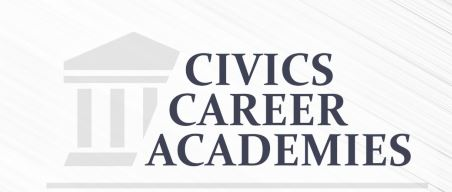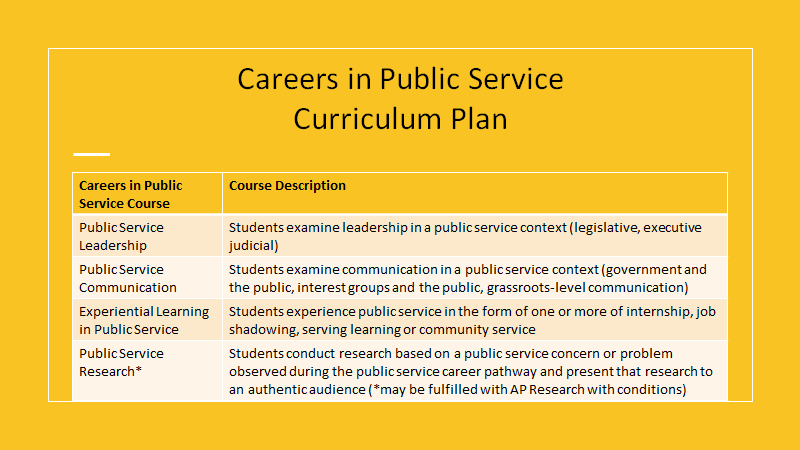About Public Service Civics Career Academy
The Public Service Civics Career Academy program offers a sequence of courses that provides coherent and rigorous content aligned with challenging academic standards and relevant technical knowledge and skills. These will prepare students for further education and careers in the Government & Public Administration career cluster; provides technical skill proficiency, and includes competency-based applied learning that contributes to the academic knowledge, higher-order reasoning and problem-solving skills, work attitudes, general employability skills, technical skills, and occupation-specific skills, and knowledge of all aspects of the Government & Public Administration career cluster.

Useful Information
The provided curriculum maps for each course are intended to provide teachers with a way to approach each course.
Users are welcome to modify the map as they see necessary.
This online professional development course was developed in partnership between the Lou Frey Institute at the University of Central Florida, Polk State College, and other stakeholders. The Careers in Public Service program offers a sequence of courses that provides coherent and rigorous content aligned with challenging academic standards and relevant technical knowledge and skills needed to prepare for further education and careers in the Government and Public Administration career cluster.
PLEASE NOTE THAT COMPLETION OF THIS COURSE DOES NOT MEET THE REQUIREMENT FOR PROJECT MANAGEMENT READY TEACHING CERTIFICATION THAT MUST ALSO BE EARNED TO TEACH THIS COURSE.
Questions about the course, enrollment, or completion should be directed to Steve Masyada, Director, Lou Frey Institute.
This program is hosted and administered through Free for Teachers Canvas, an open learning management system.
This course has enabled open enrollment. Students can self-enroll in the course once you share with them this URL: https://canvas.instructure.com/enroll/3637YW. Alternatively, they can sign up at https://canvas.instructure.com/register and use the following join code: 3637YW
This resource provides a broad overview of each of the four courses that make up this program.
View the framework here:

Course Support Materials
The support materials in this section, crafted by actual course instructors, are offered to support instruction in each course. Please note that these are intended as sample lessons and teachers are free and encouraged to develop their own. Not every unit currently has a lesson. If you have a resource that you want to see posted here, please email Steve Masyada.
A. Unit 1
i. What is Public Service Leadership:
ii. Why is Public Service Leadership an Important Element of a Constitutional Republic? (Option 1):
iii. Why is Public Service Leadership an Important Element of a Constitutional Republic? (Option 2):
B. Unit 2
i. What is an effective public servant? How do public servants best use their skills and talents to serve the public?:
C. Unit 3
i. Sample Lesson Plan:
D. Unit 4
i. Sample Lesson Plan:
D. Unit 5
i. Why does social group membership affect leadership and participation in public and non-profit decision-making?:
A. Public Service Communication
i. Debates and Political Communication:
ii. What is a policy memo?:
B. Civic Health
i. What are the most significant factors influencing civic health in the United States?:
ii. Why are negotiation and collaboration skills necessary to enhance civic health?:
iii. Examining the Public Perception of the Supreme Court Leaker: Understanding Different Perspectives:
C. Responsible Use of Technology and Information
i. What does responsible use of technology and information mean in a public service context?:
D. Communication and Collaboration
i. Civil Argument & Logical Fallacies:
A. Unit 1
i. Motivations for Civic Engagement:
ii. Responsibilities and Obligations of Citizens:
B. Unit 2
i. Exploring Types of Opportunities:
ii. What are the different types of experiential learning?:
A. Identifying a Public Service Research Focus
i. Choosing Topics:
ii. Civic Engagement and Public Research:
iii. The Kanban process:
iv. Why is civic engagement important?:
B. Public Service Research Background Investigation
i. Applied and Scholars Research in a Public Service Context:
ii. Best Practice and Source Reliability:
iii. Knowing the Difference Between Applied and Scholarly Research:
Course Curriculum Maps
The provided curriculum maps for each course are intended to provide teachers with a way to approach each course.
Users are welcome to modify the map as they see necessary.
The course is designed to develop competencies in public service leadership with a focus on approaches to leadership, leadership techniques, leadership skills development and leadership strategies. The course provides a practical introduction to the work environment through direct contact with professionals in the public service community.
Public service leadership includes both appointed and elected leadership, and leadership within the non-profit community.
The course is designed to develop competencies in public service communication with a focus on interpersonal communication skills, advocacy, responsible use of technology and information and using communication in collaborative contexts. The course emphasizes the concept of civic health as an element of public health. The course provides a practical focus on civic communication through debate, which includes student participation in the Florida Civics and Debate Initiative, formed to “…elevate civic knowledge, civic skills, and civics disposition for …high school students” (Florida Civics and Debate Initiative).
Public service communication includes communication within and between the branches and agencies of government, and within and between non-profit agencies. As well, public service communication focuses on communication between government and the public, and the role that political parties, interest groups, the media and civic organizations play as intermediaries between the public and government.
The course is designed to develop competencies in public service experiential learning. The course focuses on why experiential learning is an important component in career or college public service preparation, and how engagement in the political, governmental, and non-profit sectors supports classroom instruction about the various aspects of public service. Experiential learning gives students the opportunity to “learn by doing”. Students participate in hands-on public service experiences and reflect on those experiences so that they can better connect the approaches, practices and knowledge gained in their coursework to real-world and research-focused case studies.
Experiential learning may occur in a structured classroom environment, within the school setting or outside the school. The balance between class meetings and activities outside class, and the requisite number of experiential learning hours that students are required to complete, will be determined by the district, school, or teachers based on district, school and teacher priorities.
Experiential learning in public service will help students better understand how public service functions and its role in a constitutional republic. Students may be exposed to government interactions with the public at the community level. Experiential learning requires students to engage professionally with public service and non-profit leaders, and their stakeholders and constituencies, including government and the public. These skills and experiences will further inform student learning in their public service academies coursework and build self-confidence and leadership skills.
The course is designed to develop competencies in public service research. “Public Service Research” serves as a capstone course for the public service career pathway. The purpose of the course is for students to identify a public service problem or issue and to develop a research-based plan to address that problem or issue. The course will conclude with students presenting their research-based plans to an authentic audience (e.g., social studies teachers, stakeholders, public service leaders).
Note: Students may choose to complete the College Board Advanced Placement Research (AP Research) course in lieu of the Public Service Career Pathway “Public Service Research” course. Completing a public service research project as part of the AP Research course will enable students to simultaneously complete the public service career pathway and the AP Research course.
